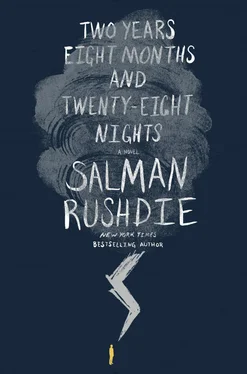And at once there was more electricity news: at the terminus of the 6 train at Pelham Bay Park, an eight-year-old girl fell onto the tracks and the steel melted like ice cream, allowing the girl to be rescued unharmed. At a safe deposit facility near Wall Street burglars succeeded in using an unidentified weapon to “burn open” the doors of safes, vaults and boxes, and made off with an unspecified sum in the “multiple millions of dollars,” according to a spokesman for the facility. Mayor Rosa Fast, under political pressure to act, called a joint press conference with the police commissioner and grimly declared all recent lightning-strike survivors to be “persons of interest,” which was, in her own ashamed opinion, clearly written across her face, a betrayal of her progressive liberalism. Her statement was predictably condemned by civil liberties groups, political rivals and many newspaper columnists. But the old liberal-conservative opposition lost its meaning when reality gave up being rational, or at least dialectic, and became willful, inconsistent, and absurd. If a boy rubbing a lamp had summoned a genie to do his bidding, that would have been a credible event in the new world our ancestors had begun to inhabit. But their senses had been dulled by long exposure to the everydayness of the everyday and it was hard for them even to accept that they had entered an age of wonders, much less to know how to live in such a time.
They had so much to learn. They had to learn to stop saying genie and associating the word with pantomime, or with Barbara Eden in pink harem pants on TV, blonde “Jeannie” in love with Larry Hagman, an astronaut who became her “master.” It was extremely unwise to believe that such potent, slippery beings could have masters. The name of the immense force that had entered the world was jinn.
She, Dunia, had also loved a mortal man — never her “master”—and many lobeless children were the consequence of that love. Dunia searched out her earmarked descendants wherever they were. Teresa Saca, Jinendra Kapoor, Baby Storm, Hugo Casterbridge, many more. All she could do was plant in their minds the knowledge of who they were and of their scattered tribe. All she could do was awaken the bright jinn within them and guide them towards the light. Not all of them were good people. In many of them human weakness proved more potent than jinni strength. This was a problem. As the slits between the worlds broke open the mischief of the dark jinn began to spread. At first, before they began to dream of conquest, the jinn had no grand design. They created havoc because it was in their nature. Mischief and its senior sibling, real harm, they foisted without compunction upon the world; for just as the jinn were not real to most human beings, so also human beings were not real to the jinn, who cared nothing for their pain, any more than a child cares for the pain of a stuffed animal she bangs against a wall.
The influence of the jinn was everywhere, but in those early days, before they fully revealed themselves, many of our ancestors did not see their hidden hands at work, in the collapse of a nuclear reactor, the gang rape of a young woman, or an avalanche. In a Romanian village a woman began laying eggs. In a French town the citizenry began turning into rhinoceroses. Old Irish people took to living in trash cans. A Belgian man looked into a mirror and saw the back of his head reflected in it. A Russian official lost his nose and then saw it walking around St. Petersburg by itself. A narrow cloud sliced across a full moon and a Spanish lady gazing up at it felt a sharp pain as a razor blade cut her eyeball in half and the vitreous humor, the gelatinous matter filling the space between the lens and the retina, flowed out. Ants crawled out of a hole in a man’s palm.
How were such things to be understood? It was easier to believe that Chance, always the hidden principle of the universe, was joining forces with allegory, symbolism, surrealism and chaos, and taking charge of human affairs, than it was to accept the truth, namely the growing interference of the jinn in the daily life of the world.
When the rake, restaurateur and man-about-town Giacomo Donizetti first left his hometown of Venice, Italy, as a young fellow of thirteen and set out on his travels, his mother, a Black Jew of Cochin who had married his Italian Catholic father at the Sri Aurobindo ashram in Pondicherry when they were both spiritual and young — with the Mother herself, Mirra Alfassa, performing the ceremony at the age of ninety-three! — gave him a parting gift: a square of chamois leather folded into the shape of an envelope and tied with a scarlet bow. “Here is your city,” she told him. “Never open this package. Your home will always be with you, safe inside, wherever you may roam.” So he carried Venice with him across the world until news reached him of his mother’s death. That night he got the folded leather down from its place of safekeeping and undid the scarlet bow, which fell to pieces in his fingers. He opened the chamois envelope and found nothing inside, because love has no visible form. At that moment love, shapeless invisible love, fluttered up and away from him and he couldn’t have it anymore. The idea of home too, of feeling at home in the world wherever he was, that illusion vanished as well. After that he seemed to live as other men did but he could not fall in love or settle down and in the end he began to think of those losses as advantages, because in their stead came the conquest of many women in many places.
He developed a specialty: the love of unhappily married ladies. Almost every married woman he met was to some degree unhappy in her marriage, though the majority of them were unprepared to end it. For his own part, he was determined never to be caught in any woman’s matrimonial web. So they had the right things in common, Signor Donizetti and the Malmaritate, as he privately called them, the borderless nation of the gloomily espoused. The ladies felt gratitude for his attentions and he in his turn was unfailingly grateful to them. “Gratitude is the secret of success with women,” he wrote in his secret journal. He kept a record of his conquests in this oddly ledger-like book, and if his claims were to be believed they numbered many thousands. Then one day his luck changed.
After a night of strenuous lovemaking, Donizetti liked to seek out a well-run Turkish bathhouse, or hammam, and allow himself to be heated, steamed and scrubbed. It is probable that it was in one such establishment in Nolita that a jinn whispered to him.
The dark jinn were whisperers. Becoming invisible, they placed their lips against the chests of human beings and murmured softly into their hearts, overpowering their victims’ will. On occasion the act of possession was so profound that the individual self dissolved and the jinn actually inhabited the body of his victim. But even in cases of less-than-full possession, good people, when whispered to, became capable of bad deeds, bad folk of worse. The bright jinn whispered too, steering humanity towards acts of nobility, generosity, humility, kindness and grace, but their whispers were less effective, which may suggest that the human race falls more naturally towards the dark, or, alternatively, that the dark jinn, especially the handful of Grand Ifrits, are the most powerful of all the members of the jinn world. That is a matter for philosophers to argue about. We can only record what happened when the jinn, after a long absence, returned to the lower of the Two Worlds — our world — and declared war upon it, or rather within it. The so-called War of the Worlds which wrought such havoc upon the earth was not only a battle between the jinn world and our own but became, in addition, a civil war among the jinn fought out on our territory, not theirs. The human race became the battleground for the struggle between the bright and the dark. And, it must be said, on account of the essentially anarchic nature of the jinn, between brightness and brightness, and the dark and the dark.
Читать дальше












